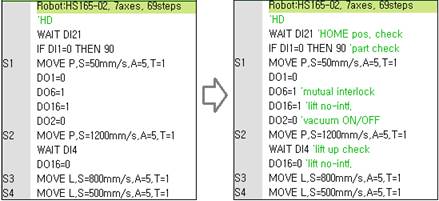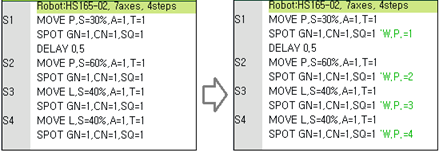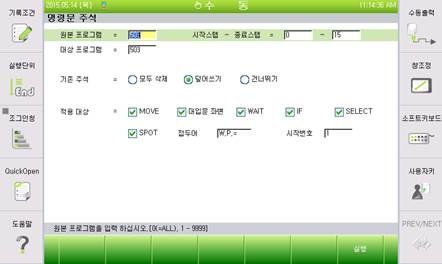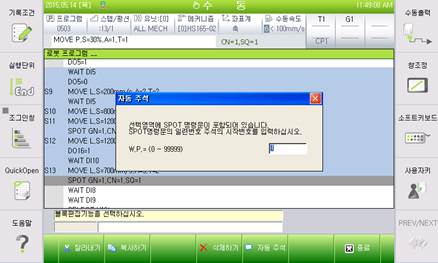4.7.8. Command statement comment
4.7.8. Command statement comment
(This feature is available from the Hi5a V40.06-00 and later versions.)
This function automatically puts annotation on imperative sentences that utilize a preset variable annotation. It also contains a function to delete an annotation en bloc and to assign a serial number to the SPOT statement, spot welding statement.

Figure 4.119 Change in the program –example 1 of performing command statement comment function (Signal assignment statement, WAIT statement)

Figure 4.120 Change in the program –example 2 of performing command statement comment function (SPOT statement)
(1) Select『[F1]: service』 → 『6: program conversion』 → 『9: Command statement comment』.

Figure 4.121 Command statement comment screen
(2) After setting the conditions, run with the 『[F7]: execution』 key.
n Source program
Number of the source program where you want to apply comment
If you set it to 0, it is performed on the entire area of all the JOB.
n Target program
Number of new target program to be saved after saving the comment
If it is the same as the source program number, it will be overwritten.
n Start step ~ End step
Range you want to change the recording conditions (The initial value is 0 – the last step)
For example, if it is set to 2–5, it will be applied from the MOVE sentence of step 2 until the end of the function of Step 5.
n Existing comment
Delete all | Delete statements where annotation is not applied to. Annotation statements, such as REM, are also deleted. |
Overwrite | If the command sentence has an existing comment, it will be overwritten. |
Skip | If the command sentence has an existing comment, it is not processed for the sentence. |
n Application target (If you select “delete all” the existing comment, it will be hidden.)
Select target commands to apply the comment.
Target command statement | Automatic comment |
MOVE | Against the MOVE statement containing a pose expression, use the comment of the first pose variable of the pose expression as a comment of the command statement. (You can set the comment of a pose variable in the entire pose screen of the 『[F1]: service』 → 『3: variable』 or in the QuickOpen screen for the entire pose. It isn’t applied to a hidden pose MOVE statement. |
Left-hand side of assignment statement | Use the comment of left side variable in the assignment statement as a comment of a command statement. |
WAIT IF (Including ELSE IF) SELECT | Use the comment of a variable specified as a condition parameter as a comment of a command statement. (Comment of a variable can be set through the screen of 『[F1]: service』 → 『4: data comment』.) |
SPOT | Use the serial number in the range of JOB as a comment of a command statement. For example, if you set the prefix to “WP #” and the starting number to 101, the comment is automatically entered like WP #101 for the first SPOT statement and WP #102 for the second SPOT statement. |
n Prefix
It defines the prefix of the serial number to be applied to a comment of the SPOT statement. Edit using the soft keyboard.
n Starting number
It sets the starting number of the serial number to be applied to a comment of the SPOT statement.
l If the condition parameters of the statement is in the equation, a comment is determined based on a variable that occupies the first character of the equation. For example, if DI1 is “part check” and DI2 is “vacuum check,” the comment of “part check” is applied to the IF statement below.
IF DI1=0 AND DI2=0 THEN 90 ‘part check
l In the block editing mode of the JOB edit screen, you can automatically enter an annotation to the currently selected statement by pressing the [F5: auto comment] key. Also, when you press the [SHIFT] + [F5 auto comment] key, it will automatically delete the comment of the selected statement. The related content is described in the “3.6 Block Edit” section.

Figure 4.122 Apply the comment of a command statement in block editing mode